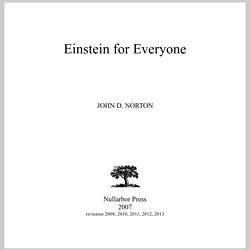

Einstein for Everyone. Einstein for Everyone Nullarbor Press 2007revisions 2008, 2010, 2011, 2012, 2013 Copyright 2007, 2008, 2010, 2011, 2012, 2013 John D.

So you think YOU'RE confused about quantum mechanics? An invitation-only conference held back in 2011 on the topic "Quantum Physics and the Nature of Reality" (QPNR) saw top physicists, mathematicians, and philosophers of science specializing in the meaning and interpretation of quantum mechanics wrangling over an array of fundamental issues.

An interesting aspect of the gathering was that when informally polled on the main issues and open problems in the foundations of quantum mechanics, the results showed that the scientific community still has no clear consensus concerning the basic nature of quantum physics. Quantum mechanics (QM), together with its extensions into quantum electrodynamics and quantum field theory, is our most successful scientific theory, with many results agreeing to better than a part in a billion with experiment.
However, at its roots QM is ghost-like – when you try to pin down just what it means, it tends to slip between the fingers. Quantum mechanics. Quantum mechanics ("QM") is the part of physics that tells us how the things that make up atoms work. QM also tells us how electromagnetic waves like light work. QM is a mathematical framework (rules written in math) for much of modern physics and chemistry. Quantum mechanics helps us make sense of the smallest things in nature like protons, neutrons and electrons. Complex mathematics are used to study subatomic particles and electromagnetic waves because they act in very strange ways.
Quantum field theory. Quantum Mechanics.